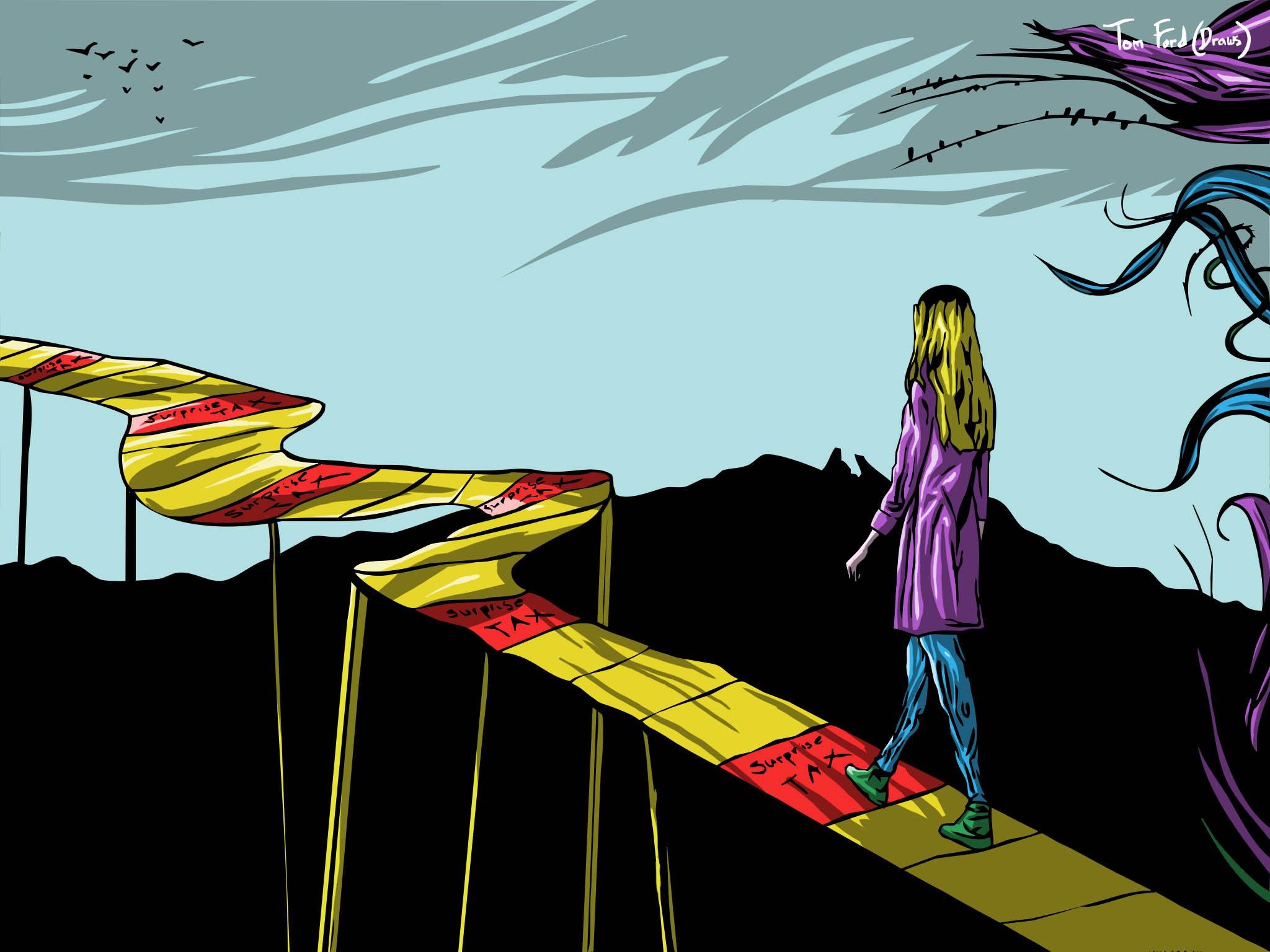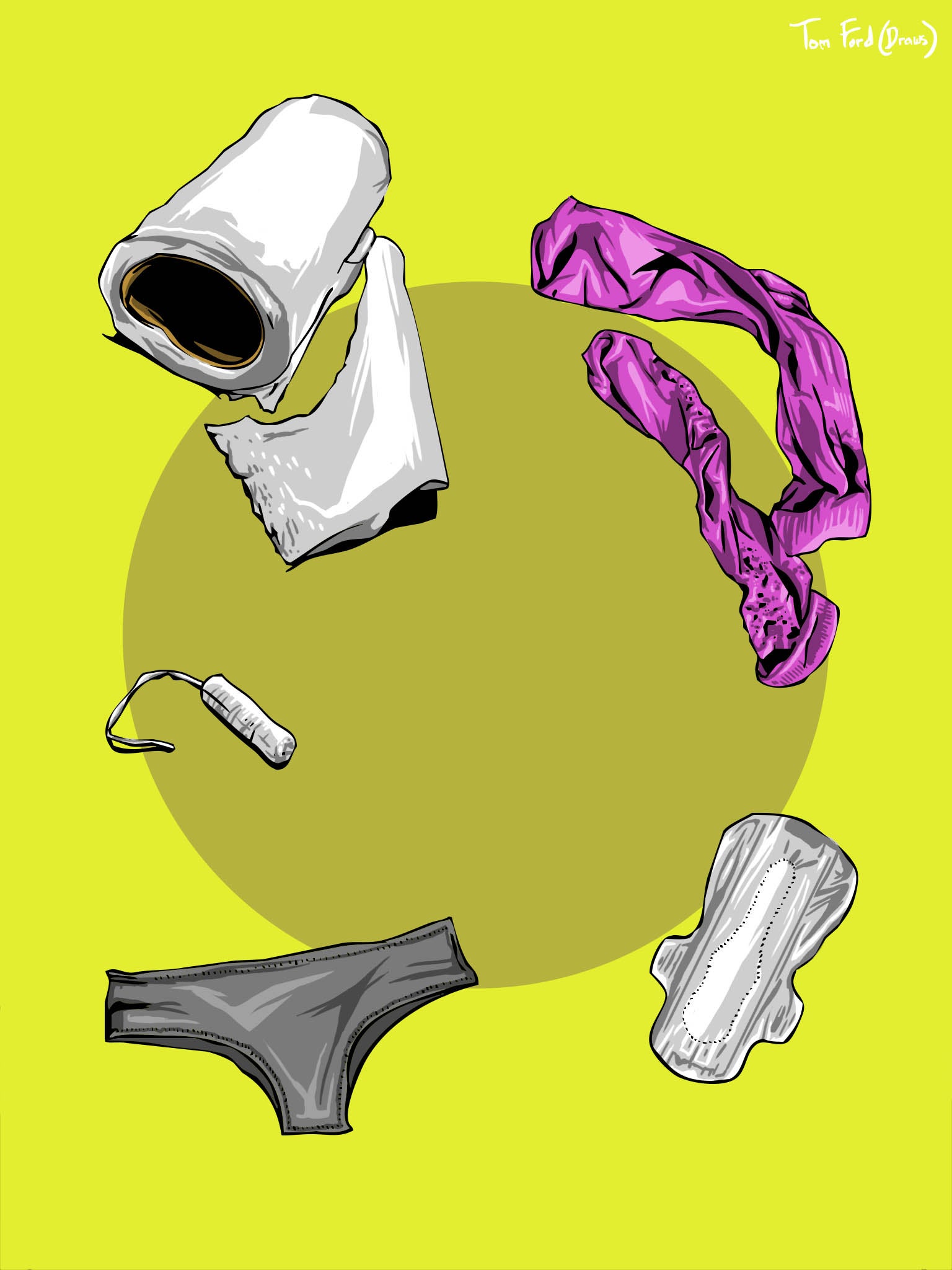You can't ask me that: Why it's never OK to ask someone if it's that time of the month
Continuing her series tackling socially unacceptable questions, Christine Manby says there are other period-related issues we should be talking about instead

Your support helps us to tell the story
From reproductive rights to climate change to Big Tech, The Independent is on the ground when the story is developing. Whether it's investigating the financials of Elon Musk's pro-Trump PAC or producing our latest documentary, 'The A Word', which shines a light on the American women fighting for reproductive rights, we know how important it is to parse out the facts from the messaging.
At such a critical moment in US history, we need reporters on the ground. Your donation allows us to keep sending journalists to speak to both sides of the story.
The Independent is trusted by Americans across the entire political spectrum. And unlike many other quality news outlets, we choose not to lock Americans out of our reporting and analysis with paywalls. We believe quality journalism should be available to everyone, paid for by those who can afford it.
Your support makes all the difference.When it comes to questions you should never ask if you value your life, then “Is it that time of the month?” directed at any woman of your acquaintance has to be right at the top. Particularly if you’re in the middle of a disagreement with said woman and you’re asking the question on the basis of that terrible old stereotype that a woman on her period is not entirely in control of her emotions thanks to her “hormones”.
Hormones? Pah! There are many more reasons why that time of the month is making women angry and none of them have to do with our bodies. Let’s start with a quiz. Which of the following items is still VAT-able? Edible birthday cake decorations, Jaffa Cakes or sanitary towels? That’s right. It’s the only one in the list that most women aged 13 to 51 (assuming an average age of menarche and menopause) can’t do without. You know we’re not referring to the Jaffa Cakes, right?
In the UK, sanitary products still have a VAT rating of 5 per cent. Back in 2015, more than 300,000 people signed a petition to scrap the tax and in 2016, the government put into place measures to do exactly that as soon as legally possible. But for now the VAT is still there, thanks to the EU, which regulates the tax. The EU considers sanitary towels a “luxury” item and needs the agreement of all its member states to make any change to that VAT-able status. In which countries, one wonders, are governments dragging their feet on this?
As it stands, the tampon tax nets the treasury £15m a year. While waiting to be able to make the products zero-rated, the government has pledged to put that £15m into women’s charities. At the same time Tesco, Waitrose and Morrisons have cut their prices to cancel out the VAT effect.
Big deal. It’s a piddling amount of money, isn’t it? Five per cent on a tampon costing around 10p a piece if you buy in bulk? The thing is, it soon adds up. In June of this year, Danielle Rowley, MP for Midlothian, addressed the House of Commons on the subject of “period poverty” bringing the subject into sharp focus when she said, “Today I’m on my period – and it’s cost me this week already £25.”
It’s estimated that the average woman in the UK spends around £150 per year on sanitary protection. For some women, the figure is necessarily much higher. A survey by Plan International UK found that one in 10 girls and women aged between 14 and 21 said they were unable to afford towels and tampons. They’ve been improvising with socks, loo roll and newspaper. They’ve been missing school rather than risk the embarrassment of a leak. All for the want of a “non-essential luxury” product?

How can you help? You can donate to a food bank or to any one of a number of charities such as Bloody Good Period, which distributes sanitary products to refugees and asylum seekers, or the Red Box Project, which provides free sanitary protection to schoolgirls. Binti International, which supports women in India, Africa, the UK and the US, is on a “menstrual dignity mission”, with three core aspects: access to pads, education on menstruation, and destigmatisation. Just £5 donated to Binti funds a packet of reusable pads that will help make sure no girl need miss school for lack of protection. In the UK, Binti is behind plans to install a free pad-dispensing machine in the toilets at London’s Central Gurdwara.
Many of the initiatives that may help to end period poverty might also have the effect of lessening the environmental impact of the disposable products we’ve been using. In the UK alone, more than 2 billion items of sanitary protection are flushed down the toilet each year. While Tampax – the big name in the business – claims their product is 100 per cent biodegradable, that’s only in landfill, not when flushed down the loo. Meanwhile, the average pad contains as much as four supermarket bags’ worth of plastic. That’s a big problem right there.
For a long time, environmentally friendly alternatives to disposable pads and tampons were limited or regarded with suspicion. That is changing rapidly. Organic pads and tampons are more widely available, as are renewable washable sanitary towels. Then there’s the menstrual cup, which can last for up to 10 years. However, the main complaint about the moon cup, which is perhaps the ultimate eco-friendly solution, is that it can be a bit of a faff. Enter the new “period pants”.
Environmental scientist Ruby Raut, founder of Wuka (Wake Up and Kick Ass) has personal reasons for wanting to make periods less of a problem. Raut grew up in Nepal and when she menstruated for the first time aged 12, she was actually banished from the family home in a tradition known as “chaupaddi”. While she wasn’t shut away in a menstrual hut, like many other girls worldwide, she was sent to stay with an aunt. Confined to one room, she wasn’t allowed to go out in the sun, see men, or touch plants (lest her “unclean” state kill them) and she was served food in a bowl that was pushed across the floor to her to avoid any physical contact. Her sanitary protection was made from pieces of old sari. She told Stylist: “I grew up in a modernised society in western Nepal, where women and girls are still sent to cowsheds or menstrual huts. They’re so small you have to crouch down inside one for four days. It’s torture.”
Now 28, Raut started Wuka, the first UK-based period pants brand, with a campaign on Kickstarter that was fully funded within two weeks. The pants, which are formed of four layers of fabric including a layer of anti-bacterial protection, can be machine washed up to 30 times and still remain effective. They can hold up to four tampons worth of blood, so using a pair 25 times keeps approximately 100 tampons from landfill.
Period pants aren’t yet the perfect solution. The absorbent fabric layer is made from a fibre that holds 200 times it’s own weight in water but it’s man-made and not fully biodegradable by any means. Raut explained: “We experimented with using biodegradable fabrics such as Tencel, but they are not as strong nor do they have a great elasticity like the polyester, resulting in a shorter product lifespan.”
However, Raut is dedicated to making her product ever more eco-friendly, starting with compostable packaging. She’s also helping to support girls back in Nepal with Wuka wash bags, made from fabric hand-loomed in the eastern part of the country. Meanwhile, Wuka is busy breaking taboos in the UK. The company’s London underground advertising campaign was the first to use the word “period” with regard to menstruation, though it stopped short at being the first to use “vagina” with a coy “va-ja-jay”. Still, at least Wuka has brought the advertising of sanitary protection a long way from the blue liquid in a beaker and improbably ecstatic trampolining women dressed all in white.
It’s still hard to imagine a time when women look forward to their period just so they can wear their special undies, but the culture of shame that has long surrounded “the time of the month” is definitely shifting thanks to entrepreneurs such as Raut. And while for now, like tampons and pads, period pants are subject to VAT, that might finally change next year if Britain leaves the EU as planned and no longer has to adhere to EU VAT regulations... There. Maybe there is a small silver panty lining to that scary no-deal Brexit after all.
In the meantime, even as I write this, there’s great news coming from Scotland where a government initiative will enable every Scottish school, college and university to provide free sanitary products starting this September, meaning that no young Scottish woman, at least, need face the indignity of period poverty.
Is that something in my eye? Must be my hormones.
Christine Manby has written numerous novels including ‘The Worst Case Scenario Cookery Club’
Join our commenting forum
Join thought-provoking conversations, follow other Independent readers and see their replies
Comments